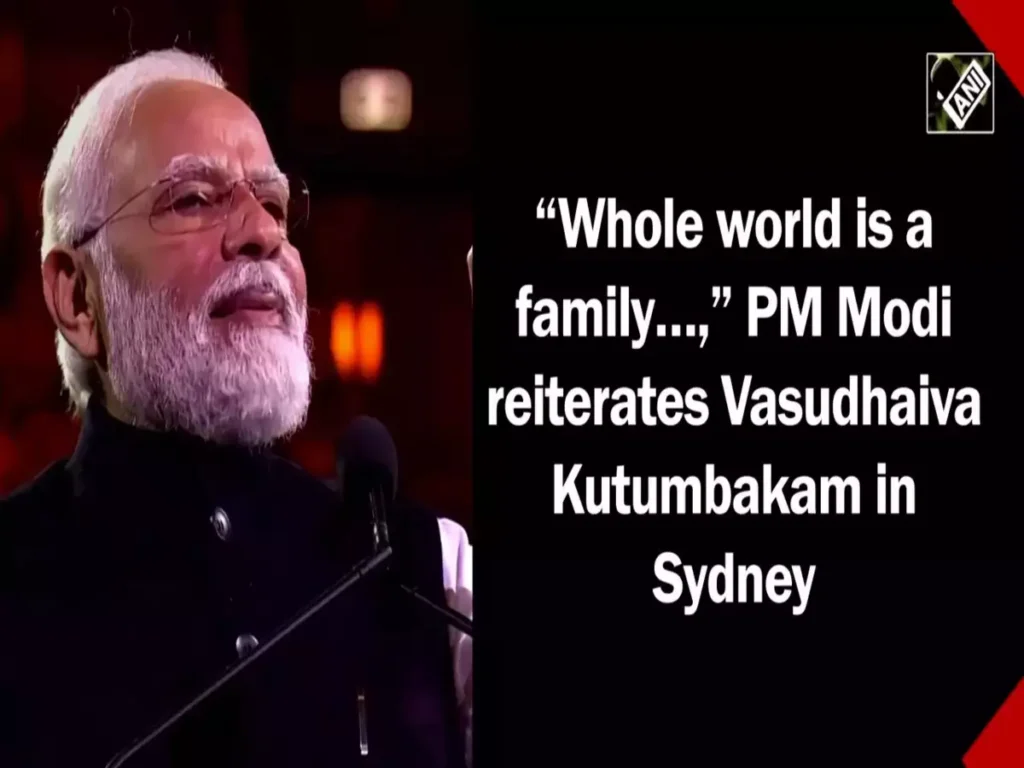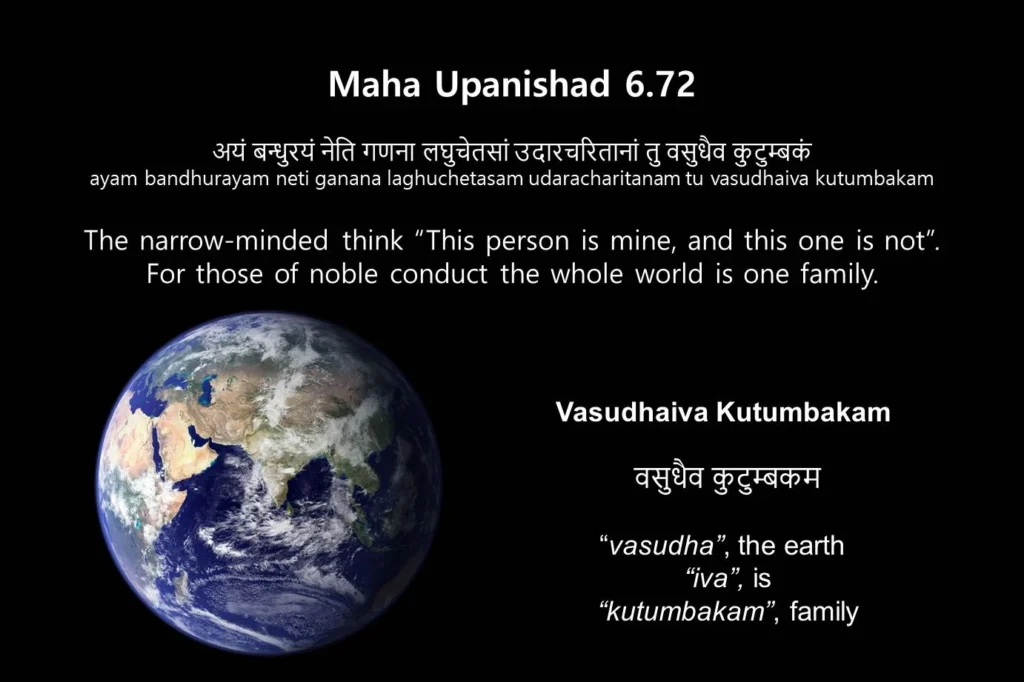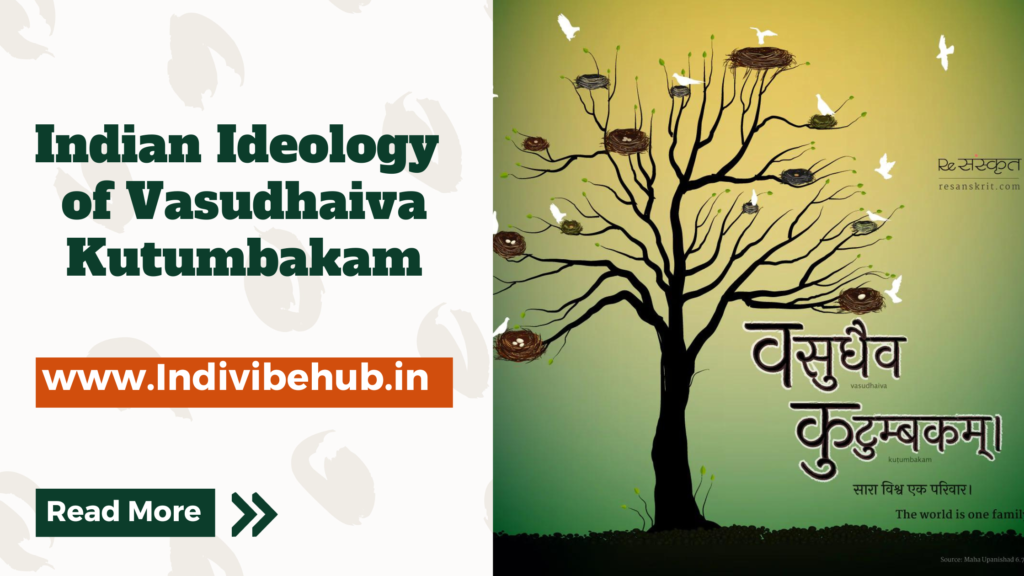Introduction
“Vasudhaiva Kutumbakam” is a Sanskrit phrase found in ancient Indian texts Maha Upanishada , which translates to “the world is one family”. This ideology forms the cornerstone of Indian philosophy and has guided India’s cultural, spiritual, and social interactions for centuries.
Table of Contents
Historical Roots

The concept of Vasudhaiva Kutumbakam originates from the Maha Upanishad, one of the ancient Indian scriptures. The verse goes as follows:
“अयं बन्धुरयं नेति गणना लघुचेतसाम्। उदारचरितानां तु वसुधैव कुटुम्बकम्॥”
This translates to: “Only small men discriminate saying: One is a relative; the other is a stranger. For those who live magnanimously, the entire world constitutes but a family.”
Philosophical Underpinnings
The philosophy of Vasudhaiva Kutumbakam is deeply rooted in the Indian understanding of reality and existence. It reflects the interconnectedness of life and consciousness, where every individual, while unique, is part of a larger cosmic whole. This ideology promotes universal brotherhood, compassion, empathy, and a sense of shared destiny.
Vasudhaiva Kutumbakam in Indian history
The concept of “Vasudhaiva Kutumbakam,” meaning the world is one family, has greatly influenced India’s history and policies in various ways:
Encouraging Peace and Harmony: This idea encourages peace, harmony, and respect between countries. It has helped promote global peace and understanding.
Guiding Indian Leaders: Indian leaders, from Jawaharlal Nehru to Narendra Modi, have often used the phrase “Vasudhaiva Kutumbakam” to show India’s approach to the world.

Cultural Connections: “Vasudhaiva Kutumbakam” is key to India’s cultural diplomacy. It supports the use of cultural influence (soft power) in international relations.
Shaping Global Efforts: This philosophy is seen in India’s local and international actions. Examples include its role in the G20, the Vaccine Maitri project (sharing vaccines), and offering help to other countries.
United Nations Speech: Prime Minister Narendra Modi mentioned India’s ancient values, including “Vasudhaiva Kutumbakam,” in his speech at the United Nations. He said these values have guided India for a long time.
Influencing Gandhian Thoughts: Dr. N. Radhakrishnan, an expert on Gandhi, believes Gandhi’s ideas about full development, respect for all life, and peaceful problem-solving are connected to “Vasudhaiva Kutumbakam.”

Educational Impact: This concept has also influenced India’s educational system, teaching students the value of global unity and respect for diverse cultures.
Environmental Policies: “Vasudhaiva Kutumbakam” has inspired India’s approach to environmental issues, emphasizing the need for global cooperation in tackling climate change and preserving nature.
Overall, viewing the world as one family has shaped India’s way of dealing with other countries, leading to peace, harmony, and respect. This approach has been successful in bringing nations together.
Relevance in Modern Times
In today’s globalized world, the relevance of Vasudhaiva Kutumbakam is more profound than ever. It encourages us to transcend geographical, cultural, and racial boundaries and to work together for common goals. It promotes peace, harmony, and mutual respect among nations and peoples.
In the face of global challenges such as climate change, poverty, and pandemics, the philosophy of Vasudhaiva Kutumbakam guides us towards collective action and shared responsibility. It reminds us that we are not isolated beings, but part of a global family, and that our actions have far-reaching impacts.
The concept of “Vasudhaiva Kutumbakam,” meaning the world is one family, plays a big role in how India deals with other countries. Here’s a look at how:
Using Culture in Diplomacy: This idea is central to India’s efforts in sharing its culture with the world. It’s about connecting with others through art, music, and traditions, helping India make friends internationally using its cultural strengths.
Finding Common Ground in Foreign Policy: Prime Minister Narendra Modi often talks about “Vasudhaiva Kutumbakam” when discussing foreign affairs. He believes in looking for shared interests with other countries and in talking to everyone to find solutions.
Read Also India is a Hindu country : Truth or Myth?
Guiding India’s Global Actions: This philosophy is a big part of what India does both at home and internationally. For example, when India led the G20 group or shared vaccines with other countries, it was following this idea of treating the world as a family.
Speaking at the United Nations: When Prime Minister Modi spoke at the United Nations, he began by mentioning India’s ancient wisdom of seeing the world as one family. This shows how old and important this idea is for India.
Environmental Initiatives: This concept also guides India’s approach to environmental issues. India works with other countries on climate change and protecting nature, showing its commitment to caring for the Earth as a shared home.

Economic Partnerships: India uses this philosophy to create and strengthen economic ties. It believes in growing together with other nations, supporting fair and beneficial trade.
Overall, “Vasudhaiva Kutumbakam” has shaped India’s way of interacting with the world, aiming for peace and respect between countries.
Criticism of Vasudhaiva Kutumbakam
Vasudhaiva Kutumbakam, the ancient Indian philosophy translating to ‘the world is one family’, has been a guiding beacon for promoting global unity and harmony. However, in the context of the modern era, this ideology faces certain criticisms
Global Politics and National Interests: Take the United Nations as an example. While the UN’s mission resonates with the spirit of Vasudhaiva Kutumbakam through its emphasis on international cooperation and peace, in practice, national interests often prevail. For instance, the use of veto power by the permanent members of the UN Security Council often reflects national agendas rather than a unified global family approach. Decisions on international conflicts or humanitarian crises sometimes get stalled due to these conflicting national interests.

Economic Disparities: The idea of a world as one family becomes complex in the face of global economic inequality. Rich and poor nations often have vastly different priorities. Programs aimed at global wealth redistribution, like certain international aid initiatives, can be seen as impractical or even threatening by wealthier nations, who may prioritize their own economic growth and security over global equality.
Cultural and Social Differences: The concept of embracing all as one family can be challenging in the face of deep-rooted cultural and social differences. For example, international immigration policies often reflect a reluctance to fully embrace this ideology. Stringent immigration laws in many countries indicate a preference for preserving national identity and security over the idea of global familial unity.
Environmental Issues: While Vasudhaiva Kutumbakam would advocate for shared responsibility in addressing climate change, the reality is more complex. Different countries contribute to environmental problems at vastly different scales, and their willingness to cooperate in solutions like emission reductions varies greatly. This uneven commitment reflects the challenge of applying a philosophy of global unity to practical, large-scale problems.
Technological Divide: In the digital age, the disparity in technological access and literacy creates a divide that challenges the idea of a united global family. While some parts of the world advance rapidly in technology, others lag far behind, creating a gap that hinders the concept of global inclusivity and shared progress.
These examples demonstrate that while the ideology of Vasudhaiva Kutumbakam is noble and aspirational, its application in the complex, diverse, and often divided modern world faces significant practical challenges.
Conclusion
Vasudhaiva Kutumbakam is not just an ancient Indian ideology; it’s a timeless principle that continues to offer wisdom and guidance in today’s complex world. It reminds us of our shared humanity and the importance of living in harmony with each other and our environment.
FAQs
What is the basic meaning of Vasudhaiva Kutumbakam?
It means “the world is one family.”
How is Vasudhaiva Kutumbakam relevant in modern times?
It promotes global unity and peace, transcending cultural and national boundaries.
Can Vasudhaiva Kutumbakam influence global politics?
Yes, it can offer a framework for international diplomacy and cooperation.
How does this philosophy impact environmental sustainability?
It emphasizes harmony with nature and responsible stewardship of the environment.
Is Vasudhaiva Kutumbakam unique to India?
While it originates from India, its principles resonate universally across cultures.




I don’t think the title of your article matches the content lol. Just kidding, mainly because I had some doubts after reading the article.
wonderful post.Ne’er knew this, appreciate it for letting me know.
Thank you for your sharing. I am worried that I lack creative ideas. It is your article that makes me full of hope. Thank you. But, I have a question, can you help me?
Utterly pent content, Really enjoyed looking through.
I’m not that much of a online reader to be honest but your blogs really nice, keep it up! I’ll go ahead and bookmark your website to come back later on. Many thanks
Your point of view caught my eye and was very interesting. Thanks. I have a question for you.
Thank you for your sharing. I am worried that I lack creative ideas. It is your article that makes me full of hope. Thank you. But, I have a question, can you help me?
Keep up the fantastic work! Kalorifer Sobası odun, kömür, pelet gibi yakıtlarla çalışan ve ısıtma işlevi gören bir soba türüdür. Kalorifer Sobası içindeki yakıtın yanmasıyla oluşan ısıyı doğrudan çevresine yayar ve aynı zamanda suyun ısınmasını sağlar.
Keep up the fantastic work! Kalorifer Sobası odun, kömür, pelet gibi yakıtlarla çalışan ve ısıtma işlevi gören bir soba türüdür. Kalorifer Sobası içindeki yakıtın yanmasıyla oluşan ısıyı doğrudan çevresine yayar ve aynı zamanda suyun ısınmasını sağlar.
Thank you for your sharing. I am worried that I lack creative ideas. It is your article that makes me full of hope. Thank you. But, I have a question, can you help me? https://www.binance.com/it/join?ref=S5H7X3LP
Can you be more specific about the content of your article? After reading it, I still have some doubts. Hope you can help me.
Your point of view caught my eye and was very interesting. Thanks. I have a question for you.
Your article helped me a lot, is there any more related content? Thanks!
Very good blog you have here but I was curious if you knew of any message boards that cover the same topics discussed here? I’d really love to be a part of community where I can get comments from other knowledgeable individuals that share the same interest. If you have any recommendations, please let me know. Thank you!
I think this is among the most significant information for me. And i’m glad reading your article. But wanna remark on some general things, The website style is wonderful, the articles is really great : D. Good job, cheers
Thanks for sharing. I read many of your blog posts, cool, your blog is very good.